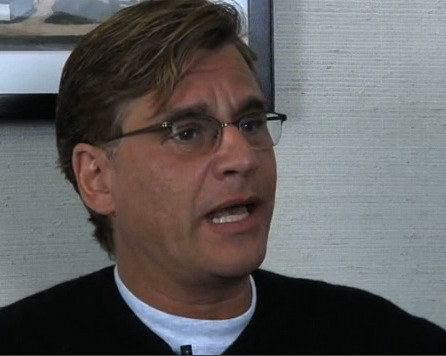
Aaron Sorkin. Photo from web.
Matthew Gentile’s article in last week’s issue of the College Voice heralded The Social Network, screenwriter Aaron Sorkin’s latest box-office triumph, as “a perfect movie.” Maybe it’s just me, but is there even such a thing as a perfect movie? Probably not, especially if we discount The Godfather.
Regardless, I found the film far from perfect.
First of all, I liked it. At times, I even really liked it. The dialogue is punchy and crisp between actors Jesse Eisenberg and Andrew Garfield as they wage exceptional legal war with each other. Some scenes are wonderfully constructed: the socially inept, extensively characterized Mark Zuckerberg verbally sparring with then-girlfriend Erica Albright is smartly done, and the Winklevosses rowing their way to a painful near-win in England is both cinematically stirring and comical.
I appreciate the movie for what it is: an entertaining two hours. I thought it was mildly thought-provoking with regard to business ethics, the technology age’s social climate and interpersonal ties that fail to hold. I refuse to glorify it for what it most decidedly is not: a factual representation of Facebook’s origins, or (maybe more importantly) a film to define this generation.
I can appreciate that stylizing an otherwise less-than-exciting story was necessary both to create a more compelling angle and to raise philosophical and moral questions about the socially-networked teens and twenty-somethings of this era. As someone who laments the progressively crude simplification of human interaction yet cannot wrench herself from her computer, I pride Sorkin on the aspects of his screenplay that shed light on this relevant phenomenon. At a party, Justin Timberlake, as the suave Sean Parker, crows about the developing trend towards living life just to post the resulting pictures online; the sentiment strikes close to home.
However, I find precious few other examples in Sorkin’s construction. He seems far more interested in portraying a college world still dominated by the attractive, old-moneyed elite, without whose approval a genius computer programmer seemingly cannot succeed in a social sense. The plight of the geek definitely has some relevance, somewhere, but at the Ivies the geeks are the masses. According to Nathan Heller, a Harvard grad writing for Slate, the blazer-wearing, snooty exclusivity of the clubs referenced in The Social Network have all but vacated the mainstream of Harvard culture.
Though it’s useless to tear down the film for its rather gaping factual inaccuracies, it’s worth noting that the real Mark Zuckerberg did not create the website of our time out of spite for an ex or even to snub the echelons of Ivy society. The girl upon whom Erica Albright is based was indeed called a “bitch” on Zuckerberg’s blog, but it still remains unclear if they ever had a romantic relationship at all. In fact, Zuckerberg has been dating a girl named Priscilla Chan since before Facebook even began; she is a brilliant Harvard graduate and her presence in his life suggests that Zuckerberg was not the lonely, can’t-get-a-girl nerd Sorkin depicts so dramatically.
So why is Priscilla entirely absent from the film? Why does Sorkin fail to indicate that Zuckerberg’s Facesmash website was a Harvard hot-or-not spinoff that rated both girls and boys? These are facts that contradict the message of loser-boy misogyny Sorkin wanted to create. He has publicly stated that he did not bend what he saw as reality to prove a point – he fully believes that the rampant sexism in his film is a genuine depiction of spiteful nerds’ and finals clubs members’ attitudes.
“I didn’t invent the Fuck Truck,” he says on television comedy writer Ken Levine’s blog, adding that girls who are always high and happily taking off their clothes, as well as Eduardo’s “psycho-girlfriend,” are “REALLY real.” The character, Christy, who in a fit of jealousy sets a fire in Eduardo’s room, is at best a very conflated mixture of two allegedly existing people.
Of course such girls exist. So do boys who see girls as objects and prizes. But where is the authenticity, the believability, in a movie that tries to say these disappointing aspects of humanity are a standard – and even more disappointingly, a generational standard?
Maybe you don’t care that Jesse Eisenberg did fantastic justice to Sorkin’s version of Mark Zuckerberg, but not to the real man behind the social network. I’m still not sure if I do. But for me, this film is less about the possible social detachedness that can come with getting to know online personas better than physical people and more about greed, and the price with which it comes. It is about a snivelly-voiced prick of an undergraduate student who coldly cares for no one in a world where money, power and sex are valued above all else. This film was a fabrication – a well-written, even fascinating fabrication, but one I found to be loosely based on the events it follows, and barely based on the real-world culture it demeans.
Yes, our generation was and is deeply touched by Facebook and the powerhouse websites that flank it. Yes, some of us would prefer to express meaningless tidbits of our lives in 140 characters or less rather than facilitate meaningful discussion. But do we primarily classify ourselves by the words we type on our screens? Are we more motivated by spite and ruthless ambition than we are by our individualism, our passion and our love?
Some people are like The Social Network’s characters, from the “psycho” to the snobby to the cruel, but to say the movie defines our generation is to blanket-categorize us unfairly and to debase the accomplishments we have brought upon this world, as well as the ones we have yet to achieve. •









